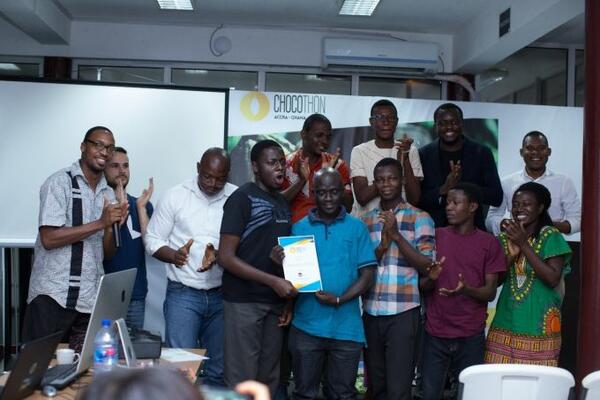
The Chocothon Initiative helps cocoa farmers in Ghana (en)
Cocoa production faces significant environmental and social sustainability challenges, which could ultimately disrupt global supply. In Ghana, the world’s second largest cocoa producer, the cocoa sector used to account for 25% of GDP, but this has declined to 7%. At least 700,000 farmers in the West African country get most or all of their income (70%– 100%) from cocoa production.
To ensure sustainability, farmers’ interests are paramount. Multinational food companies, share the responsibility of securing farmer networks that supply them with sustainable cocoa. Sustainable production and community development should be at the core of corporate strategy and daily operations. In addition, producers need knowledge and technology to bridge the economic disparity among participants along the value chain.
Such challenges cannot be addressed by a single company or stakeholder. A roadmap based on three main steps can help ensure a sustainable cocoa sector in Ghana:
• Share knowledge;
• Connect stakeholders;
• Empower cocoa producers.
A partnership of private, international and national organizations is needed for a collaborative and innovative approach to sustainable development practices. The focus of such a partnership should be the wellbeing of all actors of the cocoa supply chain, especially those at the bottom of the chain, the farmers.
The innovative and collaborative Chocothon Initiative is an interesting example of such a roadmap. The initiative is based on a partnership between the Trade for Sustainable Development (T4SD) project of the International Trade Centre (ITC), the Google Food Lab (GFL), Business School Lausanne (BSL), Future Food Institute and the Crowdfooding platform. The knowledge partners are Googlers Give Global Leadership Program, Google Accra, Nestlé, Barry Callebaut and the media partners Food Inspiration and Food Tech Connect.
The first Chocothon mission was held in January 2017 in Accra and Kumasi. The Chocothon team’s first event combined sharing knowledge among the cocoa community (private and public sector, cocoa farmers) through a three-day conference and connecting stakeholders through a two-day hackathon. During the hackathon, IT programmers and others involved in software development, including graphic designers, interface designers and project managers, collaborated intensively on software innovation projects.
Cocoa Sika, a team of web developers, social entrepreneurs and agriculturalists, was the winner of the Chocothon. Under the slogan ‘Sika pa!’ (meaning good money), the team’s entry was designed to make it easier for Ghanaian cocoa farmers to access credit. The prototype – a mobile phone and web application – aims to give farmers access to lowinterest loans and includes a system awarding loyalty bonuses to the farmers. The team won one year of co-working space from Impact Hub Accra. Two other teams were recognized for their innovative proposals. For its mobile phone and web app that gives farmers access to free business, financial tools and a data warehouse, Vocoa won six months of co-working space from ISpace. Meanwhile, for its proposal for a one-stop shop and pictorial diagnostic tool for farmers to solve problems, Chocobites won $450.
‘Other hackathons leave you to work on your idea but [the Chocothon] has periodic sessions to provide support. The business model canvas session helped a lot, enabling us to see more of the business side and deliver better value,’ says Kofi Akyeampong, Vocoa team.
As part of the third step, to empower producers, an additional event took place in Kumasi, Ghana. Cocoa producer representatives or producers’ coaches took part in a three-day training programme on using market analysis and sustainability-related tools. The objective was to provide producers with better technical assistance regarding sustainable production.
A second mission to Ghana is planned for November 2017. This aims to follow up on activities organized during the first mission and its agenda is based on the same structure: Share Knowledge, Connect Stakeholders and Empower Producers. The connecting stakeholder component includes field-testing the prototypes of the Chocothon’s winning teams with lead farmers and local producer associations.
Isolated interventions have limited impact. When collaborative efforts follow roadmaps that allow experts, buyers, producers, the youth and the vulnerable to share, connect and empower each other, it is possible to achieve significant progress towards sustainable production. The Chocothon initiative highlights the relevance of this approach, which can be reproduced in any sector and developing country.
Source: ITC.



